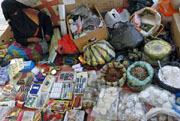VOA标准英语2011--Libyans Look to Economy as They Build Their Future(在线收听)
Libyans Look to Economy as They Build Their Future
战后利比亚人重拾信心 美好生活需要经济支持
As Libyans try to resume their normal lives after the uprising that ended Moammar Gadhafi’s 42-year rule, many hope for economic improvements and more jobs. In Tripoli, people are starting to once again go about their business.
在结束卡扎菲42年的独裁统治后,利比亚试图恢复其正常的生活,很多人希望经济有所改观,有更多的工作岗位。在的黎波里,人们开始再一次做起生意来。
At one of the capital city's modern shopping centers, repair work was under way to fix the damage caused when the city became a battleground just a few weeks earlier.
在的黎波里其中之一的现代购物中心,维修人员正在修理几周前这里成为战场时带来的满目疮痍。
Inside, it was a normal shopping day, but people could hardly contain their feelings.
在购物中心,这只是一天普通的购物日,但人们无法抑制自己的感情。
“I smell the freedom all the time, and all the minutes and all the seconds because my freedom and all the people’s freedom was captured for 42 years,” said one man.
一个男人激动的说道:“我闻到了自由,这种自由是无时无刻的,每一分每一秒都包含着自由,因为我的自由和全体人民的自由被禁锢了42年。”
“Thanks to God and thanks to the rebels now we are free. We’re feeling indescribable happiness about that,” said one woman.
“感谢上帝,感谢叛军,现在我们重获自由。我们感觉到无以名状的幸福。”一个女人表示。
Not far away, in the old city bazaar, fabric salesman Siarraj Bashir Ayad said there was almost no business during the revolution. Now he said, things are a little better, and he hopes for even more business in the coming months.
不远处,在古城的市场,织物销售员Siarraj Bashir Ayad表示革命期间生意无人问津。而现在,情况稍微有所改观,他希望在接下来的几个月有更多的销售业绩。
“One hundred percent for sure tourism will be much, much better than it used to be. In the past, tourists were monitored by security forces. Now they will have more freedom,” said Ayad.
Ayad说道:“我本人敢打保票这一地区的旅游将会比以前提升百分之一百。过去游客被安全部队监控,现在他们将有更多的自由。”
 |
| A Libyan woman sells traditional products at a stall along a street in downtown Tripoli, Libya, October 30, 2011. |
Gold shop owner Abdul Hamid Sadiq Abeyah also has hopes for the tourist trade.
金店老板Abdul Hamid Sadiq Abeyah也对旅游业表示希望。
“We have tourist sites that were neglected during Gadhafi’s time. We hope the new government will take better care of these areas,” he said.
“我们有在卡扎菲时代被忽视的旅游景点,我们希望新政府更好地利用这些区域。”他说道。
He is talking about sites like this Roman ruin just 100 kilometers east of Tripoli on the shore of the Mediterranean.
他谈论的是像Roman ruin这样的在地中海海岸现的景点,而且距离的黎波里东部只有100公里。
Tour guide Osama Mohammed Krema gives his perspective. "I’m a guide on the site of Leptis Magna. Leptis Magna is one of the best heritage sites still preserved right now. The work in the city is only 30 percent done, and 70 percent is still under the sand.”
导游Osama Mohammed Krema则给出了他的观点:“我是Leptis的导游。Magna. Leptis Magna是现在仍然保存完整的最好的遗迹之一。这个城市对旅游的工作仅做了30%,剩下70%的旅游资源仍然被埋在沙子里没有开发出来。”
Much of Libya’s income will continue to come from its oil exports.
利比亚的大部分收入将仍然仰仗石油出口。
But journalist Fathi bin Isa said Libya’s future prosperity will depend on what kind of country Libyans decide to have.
但记者Fathi bin Isa表示利比亚未来的繁荣取决于利比亚决定成为什么样的国家。
“When we determine the nature of the state, then we will determine what kind of economy we will have, whether it will be a directed economy or an open market economy,” bin Isa said.
“我们决定国家的性质,我们就要首先确定国家的经济体制,是直接经济或开放市场经济,这是一个问题。”Fathi bin Isa说道。
That will be among the many questions facing Libyans as they work on their political and economic future.
那将是在许多利比亚人面临的问题,因为他们为自己的政治和经济未来努力。